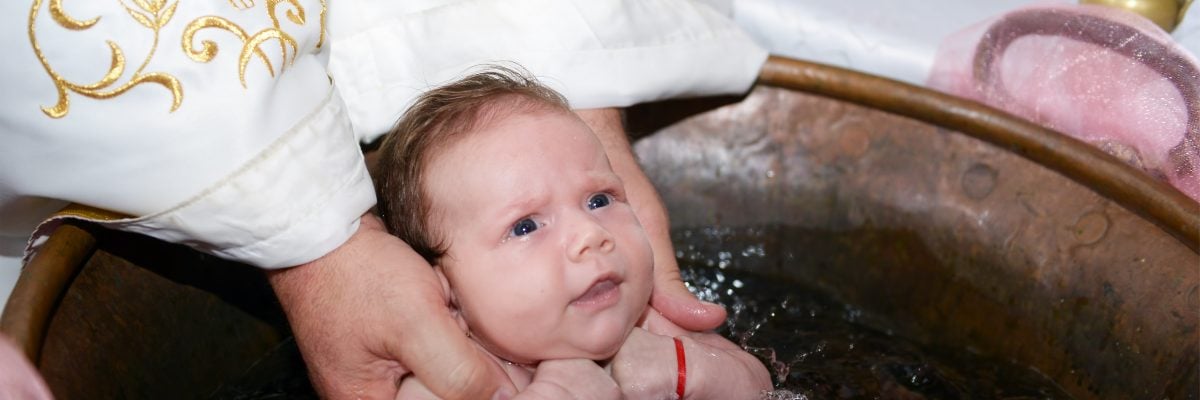
“Are you born again?”
Protestants love to ask Catholics this question. Some Catholics fumble their words, not knowing how to respond. But those who study apologetics know to answer with a resounding “Yes,” since Jesus teaches that to be baptized is to be born again:
“Truly, truly, I say to you, unless one is born anew, he cannot see the kingdom of God.” Nicodemus said to him, “How can a man be born when he is old? Can he enter a second time into his mother’s womb and be born?” Jesus answered, “Truly, truly, I say to you, unless one is born of water and the Spirit, he cannot enter the kingdom of God (John 3:3-5; emphasis added).
But some Protestants don’t see baptism in this passage. They arrive at different conclusions about what it means to be “born of water” and so they have a ready comeback to Catholics who cite the above verses. Let’s examine some of their alternative explanations and see if they carry any weight.
One explanation sees the “water” as referring to the amniotic fluid of our mother’s womb, through which we passed during our biological birth. The second birth, so it’s argued, is being born only of the Spirit—when you confess Jesus as Lord.
But there are some problems with this interpretation. First, isn’t it kind of obvious? Why would Jesus need to stipulate that biological birth is a condition for heaven when all those hearing his message were already born? It seems pedantic.
Second, the context reveals that Jesus includes both spirit and water in the one act of the second birth. He doesn’t say, “You must be born of water, and then born of the Spirit.”
Scott Hahn and Curtis Mitch elaborate:
The syntax of this verse in Greek suggests that Jesus is speaking, not of two separate births, one by water and another by the Spirit, but of a single birth through the working of water and Spirit together.
This interpretation is further confirmed by the fact that the Spirit and water together constitute the one event of Jesus’ baptism, which John hints at in John 1:29-34 and Matthew chronicles in Matthew 3:13-17.
Therefore, there is good reason to think that the water and spirit together constitute the second birth that Jesus speaks of in the born again discourse.
A second problem is that “born of water” is not the typical language that Jesus or John uses for biological birth. Take Jesus, for example. In response to Nicodemus’s query about entering again into his mother’s womb (natural birth), Jesus says, “That which is born of the flesh is flesh, and that which is born of the Spirit is spirit” (John 3:6). Jesus’ language for natural birth is “born of flesh,” not “born of water.”
John has his own way of referring to biological birth, and it also doesn’t involve water:
But to all who received him, who believed in his name, he gave power to become children of God; who were born, not of blood nor of the will of the flesh nor of the will of man, but of God (John 1:12-13; emphasis added).
Like Jesus, John draws a distinction between the new birth of God and biological birth. But he doesn’t describe the latter with “water.” He speaks of it as “born of blood.”
Since our Protestant friend only makes an assertion and doesn’t give us any reason to think that being “born of water” refers to biological birth, and since the immediate context of the passage in question provides language for biological birth that doesn’t involve water, it’s unreasonable to interpret the birth by water in John 3:3-5 as referring to our biological birth.
Another proposed explanation is that the “water” refers to the word of God. Proponents of this interpretation use 1 Peter 1:23 for support: “You have been born anew, not of perishable seed but of imperishable, through the living and abiding word of God.” Notice how Peter associates the second birth with the “word of God.”
Protestants further support this claim with Ephesians 5:25-26, where Paul speaks of Christ cleansing the Church “by the washing of water with the word.” They then couple this with John 15:3, where Jesus says, “You are already made clean by the word which I have spoken to you.”
When you take into consideration that the second birth elsewhere in Scripture is associated with the word of God, and that the word of God is that which washes us clean, then it seems plausible for a Protestant to conclude that the water in the born again discourse refers to the word of God and not the waters of baptism.
The problem here is that the conclusion, “The water in the born again discourse doesn’t refer to baptism,” does not follow from the premise, “We are born anew by the word of God.” Philosophers have a term for this type of argument: non sequitur, which is Latin for “it does not follow.”
To be born again by the word of God is not mutually exclusive from being born anew through the waters of baptism. It’s possible that one can be born again by both, no matter how you interpret the phrase word of God.
For example, the word of God is, first, a person: Jesus. John describes Jesus as the “Word of God” in both John 1:1-3 and Revelation 19:13. But being born anew by Jesus doesn’t preclude the waters of baptism as also being a cause of our new birth. In fact, Paul tells us that it is through baptism that we are incorporated into Jesus and are able to drink of the Spirit (1 Cor. 12:13). It’s not either Jesus or the waters of baptism; it’s both-and.
The word of God that Peter speaks of in 1 Peter 1:23 is the “good news preached” (1 Pet. 1:25)—the oral preaching that Paul calls the “word of God” in 1 Thessalonians 2:13. Must we conclude that our second birth is made actual by apostolic preaching rather the waters of baptism? (Or Jesus, for that matter.) Isn’t Peter the one who commands those listening on the day of Pentecost to “repent and be baptized” in order that they may receive the forgiveness of sins and the gift of the Holy Spirit (Acts 2:38)?
Even if we take the word of God as referring to the Bible, as most Protestants readily do, it doesn’t undermine water baptism as a cause of our new birth, since the form of water baptism is straight from the Bible: “I baptize you in the name of the Father, the Son, and the Holy Spirit” (Matt. 28:19). Here too, our new birth is made actual by both the “word of God” and the waters of baptism.
It’s true that more work needs to be done to fully support the Catholic interpretation of the born again teaching. But at least we can see that attempts to reinterpret “born of water” as not referring to the waters of baptism are unconvincing. John 3:3-5 remains strong biblical evidence for spiritual rebirth by baptism.



